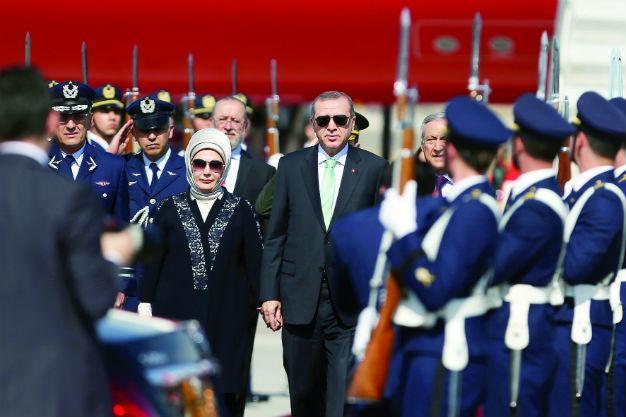Weapons seized in southeast Russian-made: Turkish president
Vahap Munyar - SANTIAGO

AP photo
All weapons seized by Turkish security forces during recent counterterrorism operations in Southeast Anatolia are Russian-made, Turkish President Recep Tayyip Erdoğan has said, while blaming both Western allies and Russia for failing to appropriately fight global terrorism and accusing them of “double standards.”
Erdoğan’s remarks presented a detailed account of Ankara’s view on efforts by the U.S.-led coalition’s against the Islamic State of Iraq and the Levant (ISIL), the status of the Syrian Kurdish Democratic Union Party (PYD) and its military wing, the People’s Defense Units (YPG), and the fate of ongoing operations against militants of the outlawed Kurdistan Workers’ Party (PKK).
“The EU hasn’t acted sincerely so far. They are giving the floor to certain representatives of the PKK in order to make speeches at the European Council,” Erdoğan said on Jan. 31 after arriving in Santiago for the first leg of a Latin America tour that covers Chile, Peru and Ecuador.
“Look, all of those weapons seized in the latest operations in the southeast are Russian-made. Previously, we told the West concerning DAESH and warned them ‘not to give weapons to the PYD,’” Erdoğan said, using an Arabic acronym for ISIL. “What did they tell us in response? ‘PYD and the YPG are fighting against DAESH.’ At the time, we told them that Russians are also fighting. Then will we call Russia ‘good?’ The Westerners are making serious mistakes about the PYD. They are saying, ‘Good terrorist, bad terrorist,’” he said.
“Just as how the PKK is accepted as a terror organization in the European Union and in the U.S., the PYD and the YPG need to be declared as a terror organization, too, because these are also terror organizations like DAESH and al-Qaeda,” he added.
Meanwhile, Erdoğan also argued that anti-ISIL coalition forces had not been displaying determination on the transfer of power from Syrian President Bashar al-Assad.
“As a matter of fact, the coalition forces should play the determination that Russia has displayed [in attempting to ensure al-Assad remains in office]. The U.N. should do so. However, they are not doing this. We believe that trying to pave the way for someone like al-Assad who is in betrayal is not right.”
Referring to bilateral tensions with Russia, the president said Moscow had been making “miscalculations” in its aggressive policy.
“For example, there was a missile fired from the Caspian Sea at Syria and which didn’t explode but it could have exploded and the price would have been very heavy. Unfortunately, on these issues, Russia is not able to calculate anything at the moment. We are acting carefully on these issues and will continue acting carefully. We will not rise to the bait.”
Methods in municipal council system
While acknowledging the gloominess in the southeast, Erdoğan voiced confidence that peace and serenity would prevail in the region after operations against the PKK achieve their goal.
“At the moment, the course of events are good in developments in the southeast. Citizens want their security to be ensured. Sure, difficulties are being experienced and there are martyrs who are losing their lives. Our hearts are sinking. But following these difficulties, serenity will come to the region. We are getting the terrorist organization to pay a heavy price and they will continue paying,” he said.
While reiterating that he is against the closure of political parties in principle, Erdoğan underlined that any party executive or municipal authorities, including mayors, should “pay the price for the crimes they have committed.”
“Prosecutors are now preparing cases,” he said, referring to the possibility of lifting the parliamentary immunity of deputies of the pro-Kurdish Peoples’ Democratic Party (HDP), which both he and the ruling Justice and Development Party (AKP) accuse of supporting the PKK, as well as legal actions taken against mayors and municipal council members elected from the HDP. “Immunity should not be exploited,” he added.
“When the [summary of proceedings] come to parliament, our parties should do what is required,” he said.
“If one of the parties stand by the ruling party, then it would be a very significant message to our people,” he added.
He also argued that mayors who have been suspended should no longer be replaced by other municipal council members, effectively demanding that outside caretakers should assume power.
“The government should develop methods that will not give an opportunity to an election among municipal council members. The required appointment should be made swiftly by the Interior Ministry and the process will continue in this way. There are methods for this,” he said.
